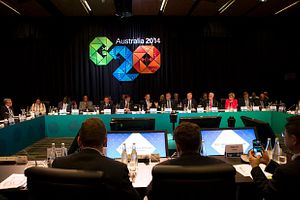While the APEC Leaders’ Summit in Beijing was probably the most eventful of the three multilateral meetings last week, the G20 turned out to be very beneficial for Japan. While Prime Minister Shinzo Abe’s brief meetings in Beijing with Chinese President Xi Jinping and South Korean President Park Geun-hye occupied most of the attention of the international media, sideline meetings in Brisbane resulted in more concrete results. The job for Tokyo now will be to make sure that what was proposed in Australia is followed through on, as the new recession at home is likely to force the Abe administration to look to foreign policy for success.
While talk of further high-level meetings between Japanese and Chinese officials was bandied about during the APEC Summit, their respective finance ministers made short work of putting it into action when they met on Saturday. Specifically, Taro Aso and his Chinese counterpart Lou Jiwei agreed to resume working-level negotiations that stalled in 2012 “on comprehensive cooperation in financial affairs, including the holding of government bonds of the other country. Japan also agreed to make it easier to conduct renminbi transactions in financial markets in Tokyo,” according to the Asahi Shimbun. As both sides have noted the decline in their economic cooperation since relations soured in late 2012 (and as both of their economies have sputtered as of late, Japan’s more so than China’s), it appears the two neighbors have decided to resume dialogue over an issue that would be mutually beneficial.
While Aso worked to jump-start improving Chinese relations, Abe held several important bilateral meetings, the most important of which was with U.S. President Barack Obama. As their self-imposed deadline to update their Defense Cooperation Guidelines by the end of the year looms, the two agreed to keep working on the update. Significantly, they left out mentioning the deadline, as the U.S. has indicated of late that it would be willing to let Japan’s government iron out a legislative framework for its new interpretation of collective self-defense first, so that a greater security role for Japan could be established within the guidelines. Their meeting on Sunday was likely a reaffirmation of that strategy, while Obama also encouraged Abe to continue efforts to mend ties with its other regional security partner: South Korea.
Abe also held talks with two other leaders that are linchpins in Japan’s regional strategy: India and Singapore. Abe’s meeting with Indian Prime Minister Narendra Modi were in large part a continuation of those held during their respective state visits to each other’s capitals, but with an emphasis on security. They agreed to “accelerate talks on proposed exports of the Maritime Self-Defense Force’s US-2 amphibious rescue aircraft to India.” Abe also proposed a bilateral meeting of their defense ministers, while the two agreed to “hold a meeting of their vice foreign and defense ministers at an early date to enhance bilateral security cooperation.” Interestingly, Abe also highlighted the need to grow the security relationship between India, Japan, Australia and the U.S. as a counter to China, according to the Jiji Press.
Aside from security, Abe said he plans to double both Japanese investment and the number of companies in India, and that “he expects India to become the first country outside Japan to operate a Shinkansen bullet train system.” This last goal is still quite ambitious, not only because China is also interested in selling India its own high-speed rail system, but because New Delhi is still several years away at best from sourcing the funds and political capital necessary to go forward with such an ambitious project.
Abe is much more likely to sell Japan’s Shinkansen technology in Southeast Asia, which is exactly what he brought up in his meeting with Singaporean Prime Minister Lee Hsien Loong on Monday. Japan’s premier said he hoped Lee would consider Japan’s high-speed rail for the project planned to connect Singapore with the Malaysian capital of Kuala Lumpur. This project is currently the most likely to get off get off the ground in the region, and is the subject of some intense lobbying by Japan and China. Lee was quoted as saying “he regards Japan’s bullet train technology very highly,” according to Kyodo News, and that he appreciates the recent improvement in Tokyo-Beijing relations. Singapore for its part is likely drawn to the long safety record that Japan’s high-speed rail enjoys, something China cannot boast. However, Singapore will have to work with its Malaysian partner to find a cost-effective option, and one that takes regional rivalries into consideration.

































